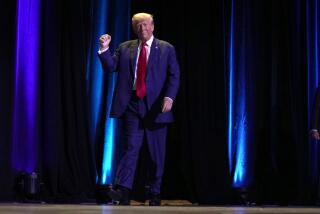Deaver’s Effort to Bar Independent Counsel Rejected
- Share via
WASHINGTON — A federal judge Wednesday rejected a constitutional challenge to the powers of independent counsel Whitney North Seymour Jr., leaving Seymour free to seek a perjury indictment against former presidential aide Michael K. Deaver.
But in denying Deaver’s request for a preliminary injunction, U.S. District Judge Thomas Penfield Jackson acknowledged that the independent counsel’s office is a “constitutional hybrid” and said he welcomes an appeals court review of the issue.
Deaver’s lawyers promptly announced that they will appeal the ruling. However, it is rare for an appellate court to block issuance of a grand jury indictment, although appellate judges often review such charges after they are made.
It is considered likely that, barring a rare intervention by appellate judges, Seymour would ask grand jurors today to return a four-count indictment against Deaver on charges that he lied to the jurors and to congressional investigators who were looking into his post-government lobbying activities.
The constitutional issue raised by Deaver has major implications beyond his case. Since Lt. Col. Oliver L. North, a key figure in the Iranian arms investigation, has similarly challenged the authority of Lawrence E. Walsh, the independent counsel investigating the Iran- contra affair, a successful appeal inevitably would cloud the prospect of criminal indictments in that case.
In making his ruling, Jackson dissolved an order that he had issued two weeks ago temporarily staying Seymour’s hand while the judge studied the merits of the challenge.
Public’s Interest Cited
Wednesday, Jackson said the public’s interest in seeing that “any possible violations of the criminal law be speedily prosecuted” will be served by allowing Seymour to “bring forth his indictment.”
Jackson acknowledged in his six-page ruling that Seymour, because he was appointed by a special court panel rather than the executive branch of government, is a “constitutional hybrid which neither the framers of the Constitution nor any court since expressly contemplated.”
Nonetheless, the judge said he believes that higher courts would uphold the 1978 Ethics in Government Act that created the independent counsel position for investigating high government officials and set out that judicial method of appointment.
Jackson said he welcomes an appeal of his ruling because “questions as to the validity of independent counsel provisions of the (1978) act . . . are most likely to be accomplished on an appeal.”
Seymour Not Available
Seymour was not available for comment after the ruling. A former U.S. attorney in New York who was appointed last May to look into allegations against Deaver, Seymour told Jackson at a court hearing Wednesday that the 1978 Ethics in Government Act “was a sensible thing for Congress to do” and did not violate the Constitution.
Lawsuits filed by Deaver and North have challenged the act as unconstitutional on grounds that the Constitution invests the power of prosecution solely in the executive branch of government.
But Seymour declared that in establishing his post, Congress and the courts sought specifically to remove such prosecutors from control by either the President or the attorney general so that they could investigate present or former government officials without being subjected to political influence or the threat of dismissal.
Such procedures are needed, he said, “to protect the public’s confidence in government.”
Deaver Sought Inquiry
Deaver himself publicly urged appointment of an independent counsel last year when allegations surfaced that he had violated the Ethics in Government Act by lobbying his former White House colleagues on behalf of private clients.
The law forbids such conduct by a former government official during his first 12 months as a private citizen and there is a lifetime ban on lobbying former colleagues on any matter in which the person was “personally and substantially” involved while in government.
Deaver stepped down as deputy White House chief of staff in May, 1985, and immediately established Michael K. Deaver & Associates to represent U.S. and foreign clients who had problems with the government.
He signed up clients whose fees totaled $4.5 million in annual contracts, including such governments as Canada and Saudi Arabia and companies like Rockwell International and Phillip Morris.
Seymour said his investigation has included examination of 50,000 pages of subpoenaed files from Deaver’s firm and other sources and the questioning of 110 witnesses before a Washington-based grand jury.
Herbert J. Miller, Deaver’s principal attorney, told the court that Seymour’s probe had all but destroyed Deaver’s business.
Most of his clients allowed their contracts to expire after the first year, according to other sources.
More to Read
Sign up for Essential California
The most important California stories and recommendations in your inbox every morning.
You may occasionally receive promotional content from the Los Angeles Times.













